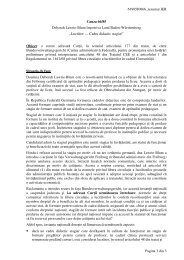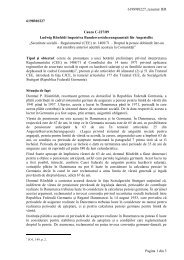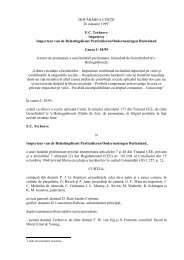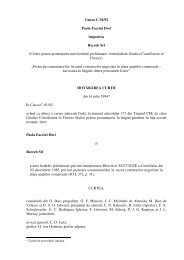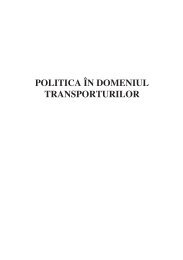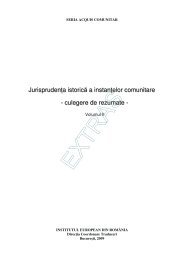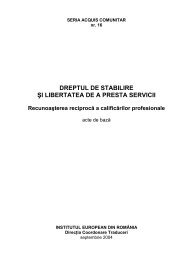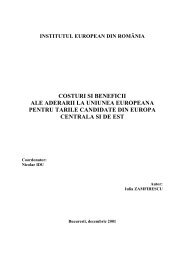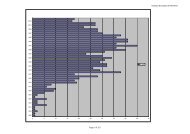Studiile de impact - Institutul European din Romania
Studiile de impact - Institutul European din Romania
Studiile de impact - Institutul European din Romania
Create successful ePaper yourself
Turn your PDF publications into a flip-book with our unique Google optimized e-Paper software.
Rezumat<br />
<strong>Studiile</strong> <strong>de</strong> <strong>impact</strong> - instrumente pentru o mai bună reglementare<br />
a politicilor publice în Uniunea <strong>European</strong>ă<br />
Prezenta lucrare analizează fundamentul şi etapele procesului <strong>de</strong> elaborare a studiilor <strong>de</strong> <strong>impact</strong><br />
la nivel european, concentrându-se asupra diferitelor meto<strong>de</strong> <strong>de</strong> lucru – fie că este vorba <strong>de</strong>spre<br />
„matricea <strong>impact</strong>ului” sau <strong>de</strong>spre „logica intervenţiei”- ce pot fi adoptate <strong>de</strong> legiuitori, în ve<strong>de</strong>rea<br />
îmbunătăţirii mecanismelor <strong>de</strong> reglementare în domeniu şi a conturării <strong>de</strong> noi perspective <strong>de</strong> utilizare<br />
a acestora. Se urmăreşte rolul şi utilitatea evaluărilor <strong>de</strong> <strong>impact</strong> în elaborarea politicilor publice,<br />
precum şi importanţa folosirii a<strong>de</strong>cvate a instrumentelor <strong>de</strong> analiză, cu accent pe obstacolele şi<br />
riscurile asociate procesului <strong>de</strong> evaluare a <strong>impact</strong>ului, prin compararea unor abordări şi meto<strong>de</strong> <strong>de</strong><br />
lucru diferite, <strong>din</strong> spaţiul european şi al statelor membre OCDE. Sunt prezentate diferite mo<strong>de</strong>le <strong>de</strong><br />
evaluare <strong>din</strong> state membre OCDE şi ale Uniunii Europene, cu trăsăturile lor specifice şi provocările<br />
pe care le presupune implementarea lor, <strong>de</strong>sprinzându-se concluzia ca tiparul <strong>de</strong> evaluare european<br />
este încă relativ <strong>de</strong>parte <strong>de</strong> a constitui un mo<strong>de</strong>l universal <strong>de</strong> analiză a <strong>impact</strong>ului datorită lipsei unor<br />
mecanisme eficiente <strong>de</strong> sancţionare. Credibilitatea unei evaluări <strong>de</strong> <strong>impact</strong> <strong>de</strong>pin<strong>de</strong> în mare măsură<br />
<strong>de</strong> rezultate, astfel că acestea trebuie să se bazeze pe date şi informaţii corecte, actualizate, care sunt<br />
totodată transparente şi uşor <strong>de</strong> accesat şi <strong>de</strong> înţeles. Rolul evaluării <strong>de</strong> <strong>impact</strong> şi, prin extensie, al<br />
studiilor <strong>de</strong> <strong>impact</strong> este <strong>de</strong> a permite legiuitorilor să verifice dacă implementarea reglementărilor în<br />
vigoare respectă parametrii stabiliţi, precum şi dacă politica respectivă şi-a atins obiectivul.<br />
Abstract<br />
This paper analyses the justifications and stages of the elaboration of <strong>impact</strong> studies at the <strong>European</strong><br />
level, focusing on the various working methods, be it „<strong>impact</strong> matrix” or the „logic of intervention”,<br />
which may be adopted by law-makers, in or<strong>de</strong>r to improve the regulation mechanisms in the public<br />
administration field and shape up new ways in which they could be used. Attention is paid to the<br />
role and the utility of <strong>impact</strong> assessment in elaborating public policies, as well as to the importance<br />
of properly using analysis instruments, with a focus on the obstacles and risks associated to the<br />
<strong>impact</strong> assessment process, by comparing different approaches and working methods, from the<br />
<strong>European</strong> and OECD area. Various evaluation patterns from OECD and the EU are presented, with<br />
their peculiarities and challenges involved by their implementation, lea<strong>din</strong>g to the conclusion that<br />
the <strong>European</strong> assessment pattern is still far away from provi<strong>din</strong>g a universal <strong>impact</strong> analysis mo<strong>de</strong>l<br />
due to the lack of efficient sanctioning mechanisms. The credibility of an <strong>impact</strong> assessment largely<br />
<strong>de</strong>pends on its results, which means they need to be based on correct and updated information, which<br />
is at the same time transparent and easy to access and un<strong>de</strong>rstand. The role of <strong>impact</strong> assessment<br />
and, by extension, of <strong>impact</strong> studies is to allow lawmakers to check up whether the implementation<br />
of existing regulations observes the established indicators, as well as whether the policy in question<br />
had reached its objective.<br />
Gabriela Drăgan este profesor universitar doctor la Aca<strong>de</strong>mia <strong>de</strong> Studii Economice, Facultatea<br />
<strong>de</strong> Relaţii Economice Internaţionale, Bucureşti şi Director General al <strong>Institutul</strong>ui <strong>European</strong> <strong>din</strong><br />
România. E-mail: (gabriela.dragan@ier.ro)<br />
Agnes Nicolescu este licenţiată a Facultăţii <strong>de</strong> Ştiinţe Politice şi Administrative, Universitatea<br />
Bucureşti şi absolventă a cursului <strong>de</strong> Master în Relaţii Internaţionale în cadrul aceleiaşi facultăţi.<br />
E-mail: (agnes.nicolescu@ier.ro)



